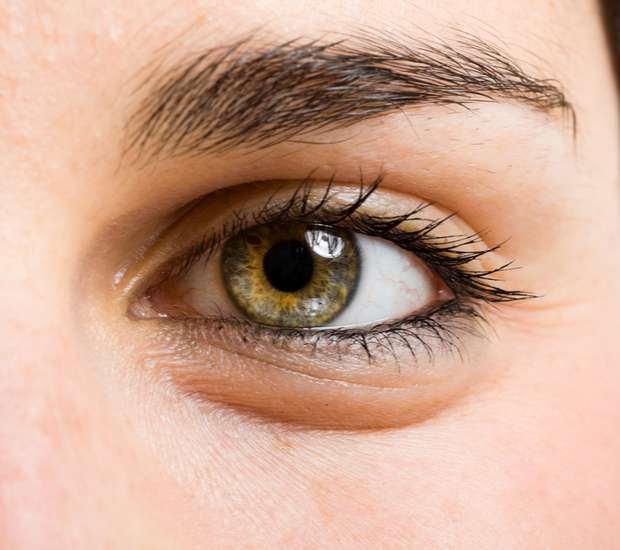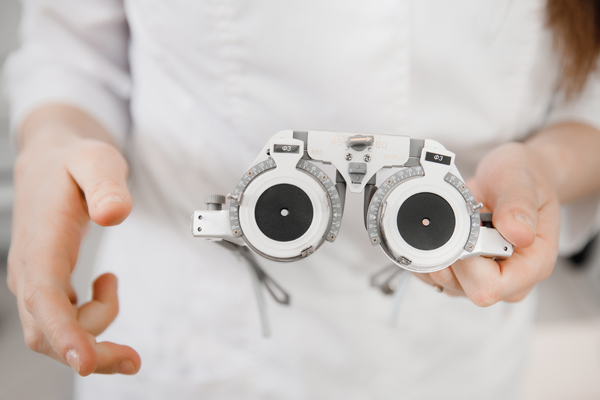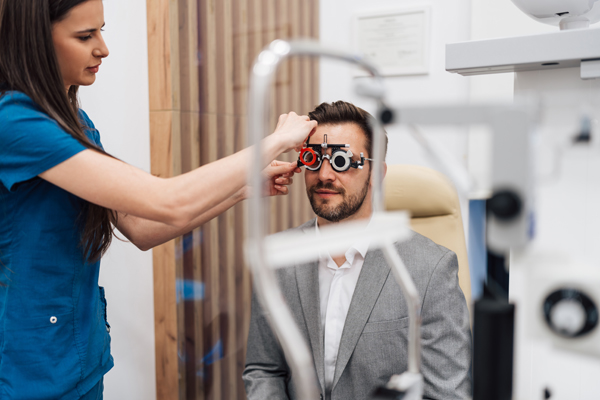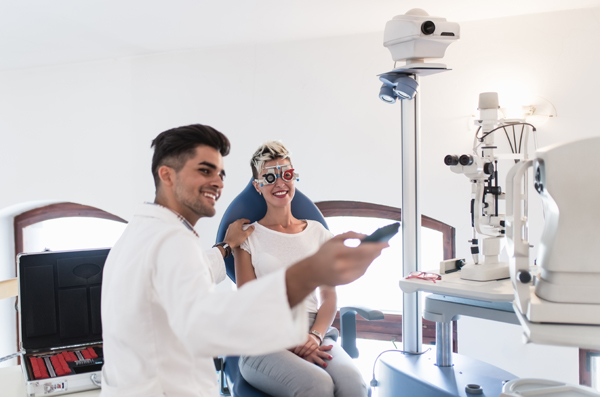Eye Disease TreatmentCarmi, IL
With early treatment and intervention, we can help to prevent eye diseases from progressing and help enhance a patient's vision. Eye disease can include infections of the eye or the eyelid, genetically inherited eye problems, and eye disorders that are the result of medical conditions such as diabetes. The majority of eye disease treatments are designed to reduce inflammation, repair injuries, and improve or save your vision.
Eye disease treatment is available at Carmi Eye Care in Carmi and the surrounding area. Our optometrist will perform an eye exam to diagnose your problem and develop a treatment plan. Typically, only an exam can detect eye disease in its earliest stages.
Call Carmi Eye Care at 618-374-0513 if you want more information about eye disease treatment and to discuss our other available health services.
Diagnosing an Eye Disease
Regular eye exams are the first step in treating eye disease. Patients who suspect they have an eye disease can schedule an appointment with us for an examination. We will ask the patient about symptoms before examining the outer and inner structures of the eyes.
The American Academy of Ophthalmology states that in a recent survey that nearly half of Americans worry more about going blind than losing their memory or their ability to walk or hear. Yet almost 30% of respondents admitted they did not receive a recent eye exam.
During an exam, our optometrist will be able to observe some signs immediately, including:
- Droopy eyelids
- Bloodshot appearance
- Opaqueness
- Needing to squint excessively
- Excessive tearing
- Swelling
- Bulging eyes
- Puffiness
We will review the patient's medical history and whether they have experienced any eye problems before. The earlier we diagnose the disease, the more effectively we can treat it. Many eye diseases have no early symptoms, and changes in vision typically only occur in the advanced stages of the disease.
Serious untreated eye problems can lead to blindness, but the good news is that 80% of blindness is avoidable. That’s why early diagnosis of eye disease is so important. Treatments can include prescription medication, surgery, prescription glasses or contact lenses.
Glaucoma
Some eye problems are genetically inherited. This includes glaucoma, a condition in which the pressure inside the eye causes optic nerve damage. Glaucoma can lead to vision loss and permanent blindness. There are two major categories for glaucoma known as open-angle and closed-angle.
Open-angle glaucoma progresses slowly and without symptoms until the disease reaches the advanced. Closed-angle, or angle-closure, glaucoma can appear suddenly and is painful. Since vision loss with closed-angle glaucoma can happen fast, this typically causes patients to seek medical attention quickly, before permanent damage can occur.
Treatment options include eye drops, pills, surgery, or a combination of all three. Once glaucoma damages eyesight, vision loss cannot be salvaged. Fortunately, early detection during a regular eye exam can help to prevent it.
Cataracts
A cataract results when the eye’s lens clouds over. Cataracts are the primary cause of vision loss in the United States. They can occur at any time but are more common as individuals age. Most of the time, cataracts form slowly and lack obvious symptoms such as pain, tearing, or red eyes. Some other symptoms include:
- Blurry, cloudy, or faint vision
- Night vision issues
- Problems with light and glare
- Seeing “halos” around lights
- Needing to change contact lens or eyeglasses prescription more often
- Faded color perception
If caught in its early stages, new eyeglasses, anti-glare sunglasses, magnifying lenses, and brighter lighting can help. If not, surgery is the only other option. It involves the removal and replacement of the cloudy lens with an artificial one.
Red or Bloodshot Eyes
Bloodshot or red eyes happen when small blood vessels on the eye’s surface become enlarged with blood. This can be caused by eyestrain, a late night, a lack of sleep, or allergies. Red eyes can also be a symptom of another eye condition, like pink eye or sun damage. Bloodshot eyes alone are usually not an issue. However, when it includes eye pain, drainage, or vision problems, there may be a more severe problem.
Our team can help determine the cause of the problem and prescribe the correct treatment. Typical treatment options include eye drops, antibiotics, creams, and oral medications. Most causes of red or bloodshot eyes are easy to treat. With early treatment, we can help to prevent any serious damage.
Itchy Eyes
Itchy eyes are a common complaint with many causes. The problem often is accompanied by itchy eyelids, red eyes, or swollen eyelids. Typically, itchy eyes are caused by some allergy. If there is also a burning sensation in the eyes, then it may be dry eye syndrome. If the eyelids are red and inflamed, the patient may have a condition called blepharitis, which is caused by bacteria.
Since the causes of itchy eyes vary per patient, it is essential to monitor the symptoms. If the symptoms do not go away or get worse, then schedule an appointment with us right away. In some cases, prescription eye drops or oral medications will provide relief. Certain medications may also help the patient become less susceptible to itchy eyes, especially if it is caused by seasonal allergies.
Call Us Today
Ignoring a potential eye disease can lead to serious visual impairment and even blindness. To talk about your vision concerns, call us at 618-374-0513 to schedule an appointment.
Frequently Asked Questions
How are eye diseases diagnosed?
Most eye diseases are diagnosed through a combination of tests. The specific tests we use will depend on the disease. Our team will use general screening tests, as well as a review of your medical history and risk factors, to determine if you need more in-depth testing. For example, testing your eye pressure and peripheral vision is an effective way to determine if you may be at high risk for or in the early stages of glaucoma.
Can eye diseases be treated?
Most eye diseases respond well to treatment. In general, the earlier they are treated, the better. However, it is not always possible to reverse damage from certain eye conditions, such as glaucoma. Catching glaucoma early allows our optometrist to provide treatments that reduce eye pressure and prevent optic nerve damage. Cataracts are typically treatable at just about any stage.
How often should I be checked for eye disease?
If you wear glasses or contacts, you should have your eyes checked every year to make sure your prescription is up to date and that your vision is not getting worse. Our team will also check for any potential eye diseases. If you notice a sudden change in your vision or are dealing with eye pain or swelling, you should call for an appointment. Sudden vision changes can indicate a severe eye issue that requires an exam.
Can I treat an eye disease at home?
Any time you suspect an eye disease, you should visit our team for a thorough exam. Trying to self-diagnose your condition can delay treatment and potentially hurt your vision. If you need more contact lenses or have another issue with the contacts, wear your glasses until you visit us. There are many different types of eye diseases, and only the doctor can make an accurate diagnosis and prescribe the proper treatment.Will I need to continue changing my prescription as I grow up?
In some cases, yes. However, the changes may be minor tweaks or alterations to the prescription. By scheduling regular eye exams, you can ensure you receive the proper prescription for your eyesight. Call us to learn more today.





